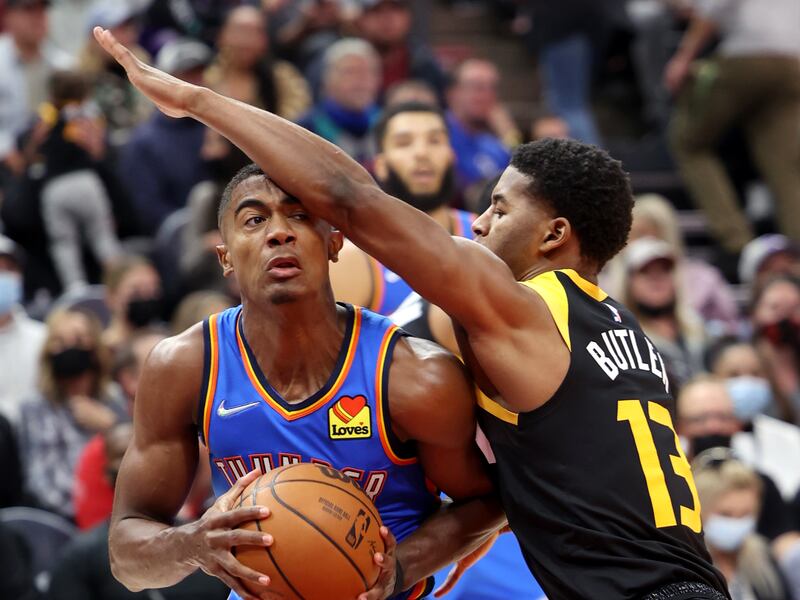Before Wednesday night’s season opening game between the Utah Jazz and Oklahoma City Thunder, OKC head coach Mark Daigneault was asked about the ways that Shai Gilgeous-Alexander has grown that can’t be seen through numbers or stats.
What Daigneault described was a player who was dedicated to improving and working out, and competitive in a way that was both in the moment but also forward-thinking.
“For someone who remains so present in the work and competition, he also sees around the corner, he sees the big picture,” Daigneault said. “He understands how this moment attaches to a future point in time. And it’s just really unique to have someone who has the ability to focus narrowly and to focus broadly.”
That comment stuck with me throughout the night and had me thinking about the people who say that the NBA’s regular season doesn’t matter, that it’s all about the playoffs.
I’ve been guilty of shrugging off games in the regular season as unimportant, and it could have been easy to do so on Wednesday — the first game of an 82-game season for the Jazz against a Western Conference team that is likely lottery bound and didn’t really have a chance of winning the game purely based on collection of talent.
But the regular season is not only about wins and losses. It’s a slow build to something much bigger, and along the way every team is hoping that the lessons and tribulations and all the lineup tinkering and experimentation are going to help them deliver a polished product to the postseason. That’s never been more true for the Utah Jazz than it is now.
Jazz head coach Quin Snyder has consistently preached the power of defense and has done a good job of getting through the regular season with good defensive ratings. But when the playoffs come around, the largest criticisms of Jazz teams concern the defense, as was the case last season.
In order to reach the playoffs and have a different result, the Jazz are putting all their eggs in the proverbial defensive basket. They know that they will be able to score, and they have a ton of fire power on the roster. But defensively, something has to change other than just beefing up the depth and versatility of the team.
The players who are returning have to be better and in order to improve they have to focus narrowly on each and every game and each individual matchup so the next night they can try to be a fraction of a percent better. That narrow focus has to be done with the larger picture in mind — old habits have to die in order for the Jazz to excel in the playoffs.
Still thinking about what Daigneault said before the game, it made the Jazz’s first post-game interviews of the year seem even more relevant.
Rudy Gobert said that he felt a difference in the way his teammates were defending. When someone got beat on the perimeter, it didn’t continue to happen over and over. Rather, he found his teammates putting in even more effort on the next possession to make sure the same mistake didn’t happen.
“When you are used to not being good, it can happen one time, twice, three times and you just keep playing,” Gobert said. “Now, it happens once and you can feel it. We hold each other accountable. And whoever got beat, on the next possession they’re twice as good.”
The Jazz were never really concerned about losing to the Thunder. But they were worried about letting Luguentz Dort and Gilgeous-Alexander beat them on the perimeter and break the defense as they have done in the past.
So the Jazz zeroed in on not letting that happen. It’s just one night and just a couple of players who the Jazz probably won’t see in the playoffs, but the experience and the improvement gained from doing things the right way will ultimately help them against the better teams they’ll have to face down the road.
“Even if we don’t have a lot of weaknesses, teams are going to try to find and take advantage of those weaknesses, especially in the playoffs,” Gobert said. “Teams are going to try some things and if it works, they’re going to keep going and keep going. If you don’t have any weaknesses, it makes it harder on the other team.”
That’s the broad focus. The Jazz don’t want to give opposing teams the same opening that they’ve had the last few years. The Jazz don’t want to be exploited for defensive weaknesses. So every single game serves as a chance to continue building on a defensive foundation. Every matchup conquered is another brick to lay down.
It’s not always going to work perfectly. The Jazz aren’t going to go 82-0 on the most perfect defense the league has ever seen, but so long as they continue to use every night as a chance to improve with the ultimate goal in mind, they’re likely to yield good results.


